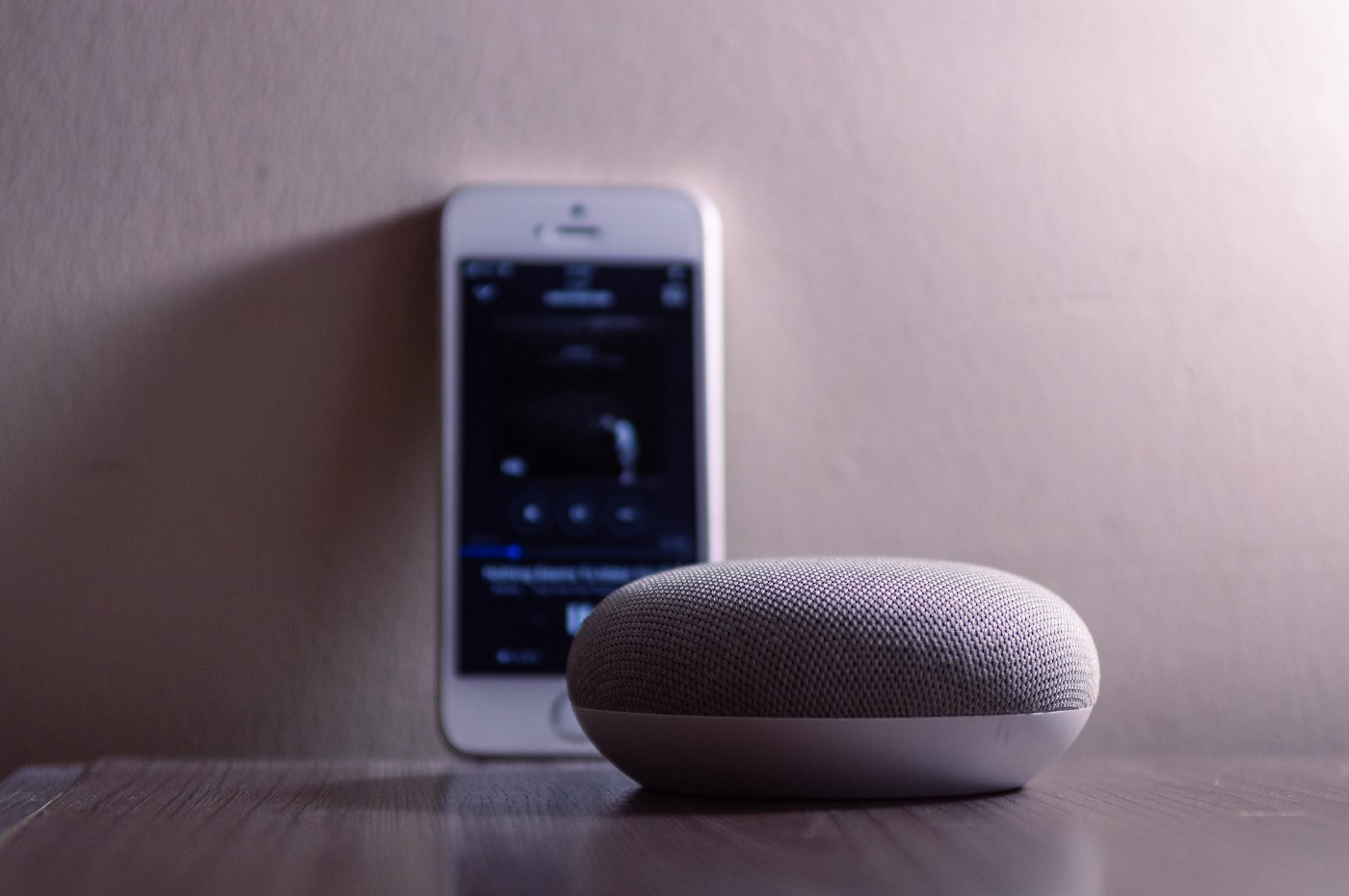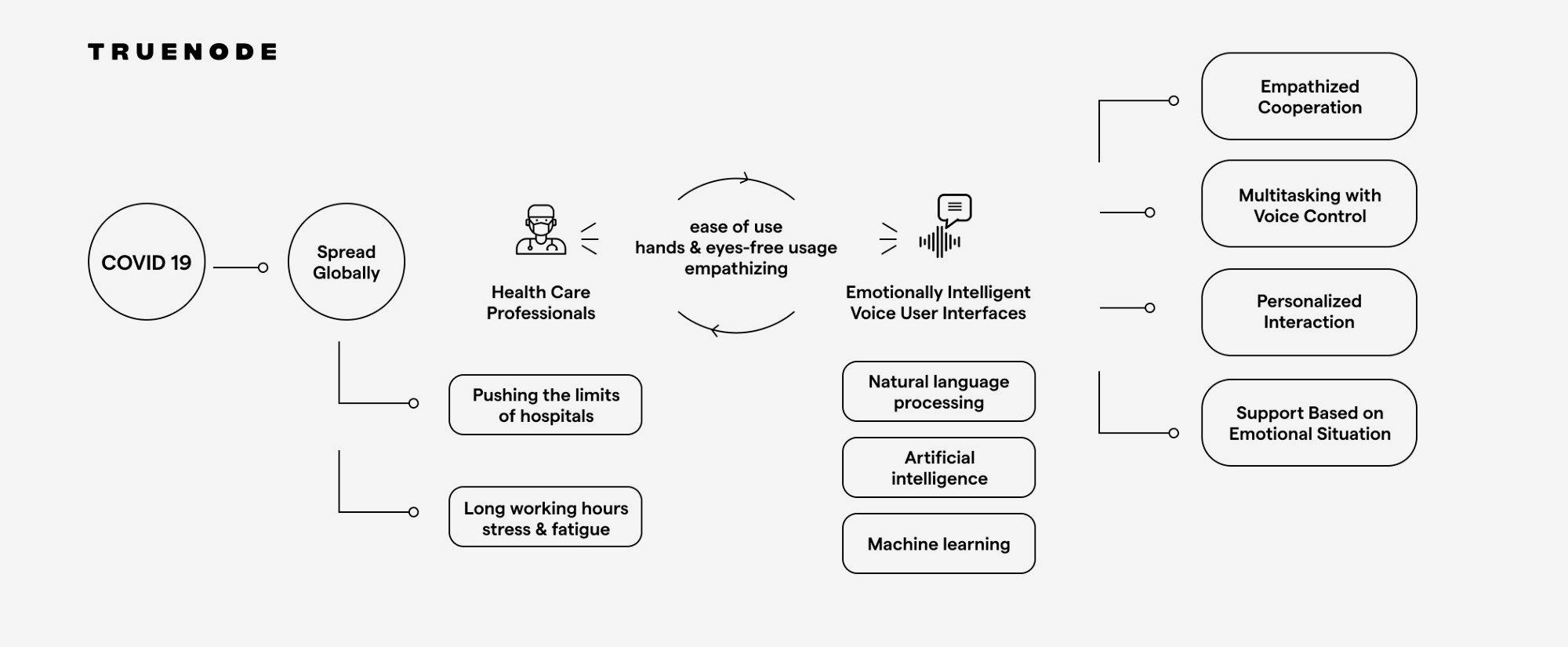Article

Emotionally Intelligent Voice Assistants
Innovation that matters.
Last months passed tough for most countries as a result of increasing corona cases. COVID-19 spread globally and caused major effects on society as well as economic systems. Schools closed, most companies introduced home offices as the new normal, and unfortunately, hospitals are full of patients. Healthcare professionals are on the frontlines, trying to heal our beloved ones by working long hours with little to no breaks, constant lack of sleep and rising stress levels. On top of that, they are concerned about their families and friends getting infected by them. Many frontline workers are forced to segregate themselves from their family for the time being.
Melanie Becker, a nurse for 15+ years has been taking care of corona patients and mentions in an interview with Zeit.de, that her workload has increased enormously. The day-to-day hospital mayhem, which is already a stretch, has been merged with additional Corona efforts to heal patients. But above all, she and her colleagues are more overwhelmed with the social awareness outside the hospital.

The public appreciates our heroes and heroines in social distance, but the reality in daily routine looks different for some when confronted in supermarkets or at home. Melanie experienced an abrupt decline in social interactions with friends, since they avoided contact and even got kicked out of local supermarkets for “safety” reasons. Technological innovations might support healthcare professionals like Melanie who need to be protected both emotionally and socially during these times by focussing on positive well-being.
Voice technologies have seen a strong growth in adoption over the past years and can address current pain points of healthcare workers by leveraging the advantages of hands eyes-free interactions. For voice control devices and voice assistants, the pandemic crisis opens up completely new applications, with the ability to empathetically understand and express emotions through voice.
Voice User Interfaces
Voice user interfaces are systems that allow us to interact with voice or speech commands with devices. These systems understand spoken commands through text-to-speech, speech-to-text, natural language processing, and other cloud services to answer specific questions of the user.

Through the years, those systems evolved and have been part of our daily lives with mobile apps like Siri, Google Now, Cortana, and voice-only devices like Amazon Echo or Google Home. Voice assistant technologies are maturing with a high pace — responsiveness increases, hands eyes-free usage becomes available, and empathy-building grows. The subtle changes of tone, pitch or speech rate in a voice enable us to understand and empathize with the users and help us understand the underlying emotions. The developments of natural language processing, artificial intelligence, and machine learning are providing us more intelligent human to human communications. We believe it’s a good time to take a closer look at the opportunities of this technology given the latest COVID-19 developments.
What is an emotionally intelligent voice interface?
Emotional Intelligence is the ability to be aware of our and others’ emotions by learning how to manage emotions, particularly under pressure. Emotional intelligent voice interfaces are products and services which are created through human-centered design to understand users’ needs and emotional behavior through human to human communication. An emotionally intelligent voice interface would establish communication with users in a more human form by considering positive and negative emotions with the help of emotion-sensing and intelligent emotional technologies. With that interaction, we would be able to find helpful coping strategies to sustain healthcare workers’ mental and physical wellbeing. Let’s think about the most desired interactions that health professionals would have with emotional voice assistants.

Empathised Cooperation
Empathy is critical to include while working under pressure, psychological distress and / or anxiety. Afterall we are humans and not everyone is ready to handle this strain. Anxiety cannot become the new normal during this and upcoming pandemics. The duty is hard, long, and full of negative surprises. The World Health Organization (WHO) prepared a document about mental health and psychosocial considerations during the COVID-19 outbreak. Feelings are still feelings and do not adjust to the situation — stress levels are high, constant fatigue present and anxiety has become an avalanche. It’s key to manage mental health and psychosocial well-being besides managing physical health, now more than ever.
The WHO strongly recommends to make sure that frontliners rest and take breaks at the job or in between shifts, eat healthy, find time to exercise or meditate, and stay connected to loved ones. The set of humanized conversational interactions in a voice assistant to counterfeit stress would be designed to make a user’s work routine easier.
Multitasking with Voice Control
The crucial point of these pandemic days is multitasking. Healthcare professionals have limited break time if they can have any. Time to eat or go to the bathroom is scarce. Voice assistants can provide companionship to assist during “in-between” tasks (documentation, reporting, calling, etc.) and support to keep chaos manageable. Voice commands can help to make phone calls while in full protection gear — it takes 5–10min to change, imagine how much crucial time is lost with +50 million healthcares workers in action globally. The commands would be calling their beloved ones while eating, while meditating, while resting to keep the mind present.
Personalised Interaction
Emotionally Intelligent Voice interfaces can be personalized by reading or listening to positive affirmations, keeping a voice commanded diary to eventually benchmark against rising stress levels. It learns from commands, music, abrupt commands or other alike interactions.
Support Based on Emotional Situation
This pandemic is a marathon, not a sprint. With emotion-sensing technologies, voice assistants would be able to consider and reply based on the emotional states of users. Through analysis, assistants can recognize emotions like anger, laughter, and arousal in speech and would guide users with personalized suggestions. Emotions sensing technologies are relatively new but improving to make voice assistants smarter and empathic. Emotional interactions are fragile, hyper-personal, and above all private. So the privacy concerns of users and the responsibility to manage personal data to make suggestions should be considered in advance because privacy is key to drive adoption and trust among users.
Emotionally intelligent voice assistants can create empathic services we need during this COVID 19 outbreak. Shout out to all the builders, entrepreneurs, intrapreneurs and idea people this is the time to apply our collective knowledge to ensure healthcare professionals’ positive well being. We salute you!






